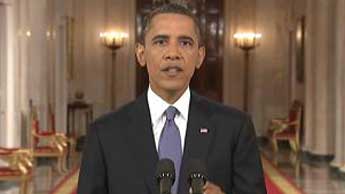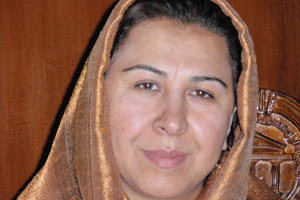Withdrawal Symptoms: Afghans Anxious Over Obama’s Out of Afghanistan Plan
So he did it. No surprises there, we all knew it in advance, down to the numbers.
By the time US President Barack Obama stood before the cameras Wednesday night to unveil his Afghan troop withdrawal plan, we already had our breaking news, our headlines, and our stories – minus the quotes - ready.

We were simply waiting for the president to mouth the figures: 10,000 US troops out of Afghanistan by the end of the year, 23,000 out by the summer of 2012.
In other words, the surge un-surged.
As for the remaining 70,000-odd troops, they will be home by 2014, when, according to Obama, “the process of transition will be complete and the Afghan people will be responsible for their own security.”
There you go: the war is over – or “the tide of war is receding” – come together.
But in Afghanistan, not everyone seems to be coming together. I’ve been calling my old friends and colleagues in Kabul and some of them, I fear, are coming apart with anxiety.
“If the American and the international troops leave in 2014, most people are afraid the Taliban will come back,” said Imamuddin Hamdard, my 31-year-old former translator who now works for the Kabul-based Bakhtar Bank, a subsidiary of Azizi Bank, one of Afghanistan’s largest banks.
“We are all afraid that history will repeat itself,” said Imamudin, referring to the brutal civil war following the 1989 Soviet withdrawal from Afghanistan. “I’m very worried about what’s going to happen. People are now saying, ‘he is from the North, he is from the South’. These differences are now showing.”
In Afghanistan, the North-South divide of course is code for the chasm between the Pashtuns and the non-Pashtuns.
As a minority Tajik, Imamudin would of course be concerned if the fragile multiethnic fabric of Afghan society rips if the Taliban, a Pashtun movement, enters the power game.
When I ask his opinion about the US holding talks with the Taliban though, his response is somewhat puzzling.
“Most people in Afghanistan think that the Americans are supporting the Taliban,” said Imamudin.
Really? But then who have the Americans been fighting for the past 10 years?
“Afghans think it is all a game. The Americans, (Afghan President Hamid) Karzai they are saying one thing and then another. One night, Karzai says the Taliban are our brothers. Another night, the TV reports that Karzai called the Taliban the enemy of Afghanistan. Nobody can say what’s true anymore.”
Welcome to the confused world of how many Afghans think.
In a war choked with mixed messages, what can you expect?
I’ve had many mind-numbingly confused conversations about the international troop presence in Afghanistan before. They typically go like this:
‘Do you support the presence of international troops in Afghanistan?’
“No. We are Afghans. We have never accepted foreign occupiers. Throughout our history, for thousands of years, we have resisted foreign occupations….”
Before I nod off to another “brave Afghan” history lesson, I interject: ‘So, should the foreign troops leave Afghanistan now?’
“No.”
‘Why not, you just said you don’t want them.’
“They must not stay forever. But they can’t leave now because the Afghan police and army are not ready to manage the security…”
‘I HOPE the international community will not make the same mistake'
To some extent, that’s exactly what Shinkay Karokhail, 49, a long-time women’s activist and member of parliament for Kabul, thinks.

“I’m definitely not in favor of having the US military in Afghanistan forever. But at the same time, we are in a critical situation and I’m not sure what will happen,” said Shinkay. “I don’t think 2014 is enough time. That’s just three years. In three years, you can’t make magic.”
Shinkay however says she remains optimistic about the future. “The withdrawal should depend on the reality on the ground. It should not be done for a political reason. I don’t think the international community will make the same mistake again,” she said, before adding a more cautionary, “I HOPE the international community will not make the same mistake again.”
Take the money and run
Shortly after Obama’s speech, I checked the Facebook page of my former journalism student and longtime fixer, who currently freelances for a number of US news organizations. I shall call him Munir.
“it makes me optimistic, the peace talks with Taliban…and Obama announcing troops withdrawal! May Allah bring a change for good in our country,” wrote Munir.
Karzai of course expressed the same optimism, describing Obama’s announcement as “a moment of happiness for Afghanistan.”
So when I called Munir, I was expecting some cheer, if not exhilaration. But he had just returned from a trip to the provinces, where he was covering the Afghan reaction to Obama’s announcement and he didn’t sound upbeat.
“In the rural, Pashtun areas, where the people suffered the bombing and the raids, and lost their family members, they don’t care if the international troops leave or not,” said Munir. “But in the cities, people are worried. The businessmen are saying they won’t be putting more money into their businesses because there are going to be problems, there’s going to be a civil war. People are saying they are going to take their money out of the country as soon as they can.”
When I pressed Munir for his own reactions, I was surprised when he told me he was worried. “I’m very concerned because there’s no clear direction. I can’t decide what to do.”
There’s a Dari saying, which translates as, “I cannot answer your question because my mouth is full of water.” In other words, I can’t quite speak the truth or I’ll be in trouble.
Back in the 1990s, when I was reporting on Afghanistan – and nobody was particularly interested – I used to hear the old refrain: “America used us and then America dumped us.”
Like Munir and Imamudin, many of my Afghan friends have clawed out of the misery of the refugee camps in Pakistan during the mujahideen war and the Taliban era to earn a decent (by Afghan standards) living as fixers, drivers and translators over the past decade.
As a journalist, I know that once the action on the ground winds down and the story moves elsewhere, the press pack will follow. So, I’m concerned about my Afghan friends who don’t have dual US, British, French or Australian citizenships. Do they have any plans?
They don’t, it seems. “For now, we can’t do anything,” said Imamudin. “We’re not sure of the future – what can we do? We can’t decide until the time comes to decide. We just have to wait.”
And hope, I guess.




2 Comments
Post new comment